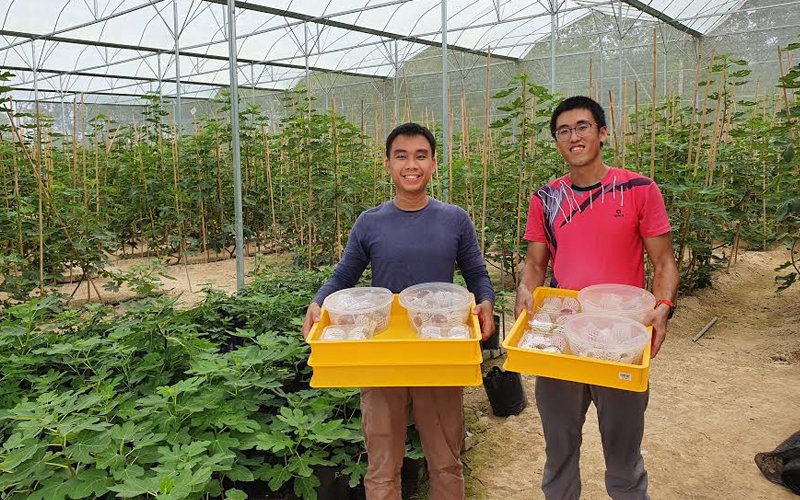
PETALING JAYA: Many may not know it, but figs are downright delicious. Taste aside, in ancient Rome, fig trees were considered sacred.
Over in Malaysia, two auditors who saw the potential of sweet success in the fig business, decided to trade their cushy corporate jobs to plunge headlong into the rough and tough world of cultivating figs for a living.
Lawrence Yew, 33, developed a love for this luscious fruit ten years ago but didn’t pursue it as a business as he was involved in other set-ups.
However, a sweet opportunity came a-knocking when fellow auditor and partner, Cheah Zao Yan expressed an interest in the fig business too. So, they set-up Figara11 and got straight down to work.

“The thing about fig trees is that they require a very specific amount of water and the Malaysian weather is either very sunny or very wet, therefore you need to have proper irrigation. Planting figs in a tropical country also means the trees are more prone to pests.
“Fig trees also grow very vigorously because of Malaysia’s sunny weather so that means we have to prune it frequently,” explains Yew.
The duo took their time scouring for fertile land and settled on an agricultural plot in Karak, Bentong with ample sunshine and water supply, both vital ingredients for fig trees to thrive.
Although itching to start planting their fig saplings fast, a lot of preparation work had to be completed first to get the soil ready for sowing.
This included clearing the land, seeing to earthworks, building a solid support infrastructure and installing a rain-proof house for the trees.
Yew humorously recalls a period when he dropped a whopping 10 kg because he and Cheah were putting in almost 12-hour days at the farm.
“One row is able to fit nine trees but it takes four to five hours to till the soil. In total we have 108 trenches, so you do the math,” he laughs.

At the moment, the pair have planted about 1,000 fig trees but have set their sights on harvesting fruit from 10,000 fig trees in the future.
Yew dishes the dirt on the best way to detect a ripe fig – just bite into it, simple as that, he says.
He explains that ripe figs are soft and have a melt-in-your-mouth texture.
He adds that Malaysians should consume locally planted figs because these are given the opportunity to ripen on the tree before harvesting.
It’s different with imported figs. Yew explains that because ripe figs are soft and fragile, they bruise easily during export. That’s why they are picked while still in an unripened state.

Figs also differ from mangoes, bananas and papayas that continue to ripen even after being harvested.
Figs that have been picked while still unripe, stay unripe. That’s why imported figs tend to have a somewhat bland, more chewy texture.
“Sometimes our customers ask why our figs are a little on the soft and mushy side but I can confirm that is exactly what figs should taste and feel like.”
Yew says that another way to determine if a fruit is ripe for picking is to check the hole at the base of the fig. If ripe, the hole is small and if the hole has a small split, it’s ready to eat.
Yew also explains that ripe figs tend to droop, meaning they are low-hanging fruit so you’ll know one when you see one.
At Figara11, RM20 will get you 250g of fresh Grade A figs of the common variety. Figara11 also offers giant-sized figs that can weigh up to 150g per fig, about the size of a jumbo avocado.

Besides cultivating and selling the fruit, the duo also spent a considerable amount of time researching its health benefits. They discovered that figs are natural laxatives, perfect for one’s digestive system.
“With this information in our hands, we thought of making the figs into a prebiotic potion because it has the good fibre and good bacteria that are required by your gut,” Yew tells FMT, adding that to make an even more potent concoction, other highly nutritious fruits like pomegranate, goji berry, cranberry, and raspberry were thrown into the mix.
They came up with the quirky name Gugu Guts that is both memorable and with an interesting story behind it.
Yew explains, “We originally wanted to name it Fig Biotics but it sounded too medicinal. Plus, Ichijiku means fig in Japanese and Gugu is a wordplay on ku.
“Gugu describes overwhelming love and happiness and when used in the context of our gut health, it simply means happy tummy. Basically, it’s a cute drink that is beneficial to your digestive system.”

The former auditor leads a very different life these days.
From crunching numbers in an air-conditioned office before, Yew’s routine these days involve driving up to Karak on alternate days to personally deliver harvested figs to happy customers.
Does he miss his auditor’s life? “Not at all,” he grins.
Interested in getting your hands on some sweet, juicy figs? Check out Figara11’s website and Facebook page for more information.



